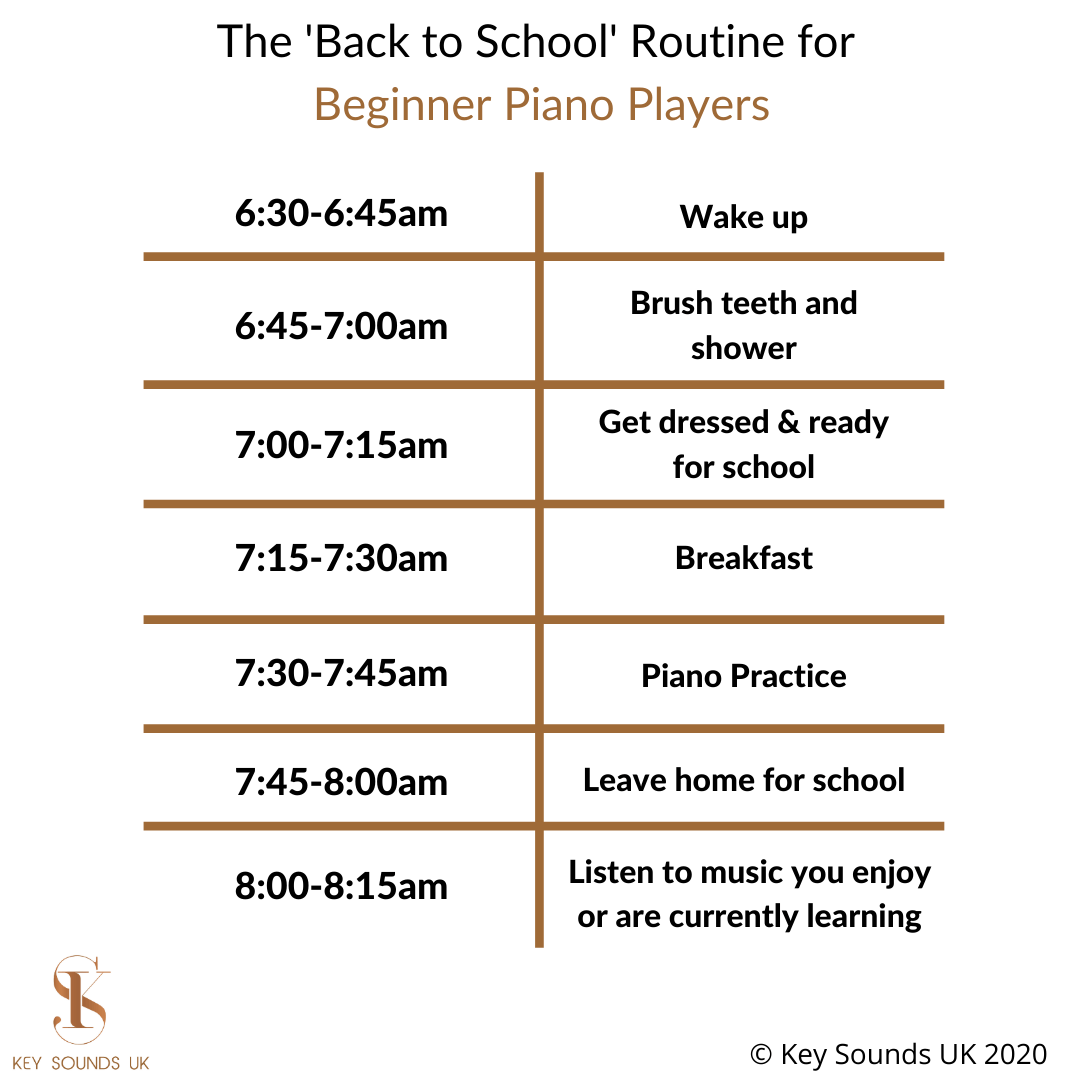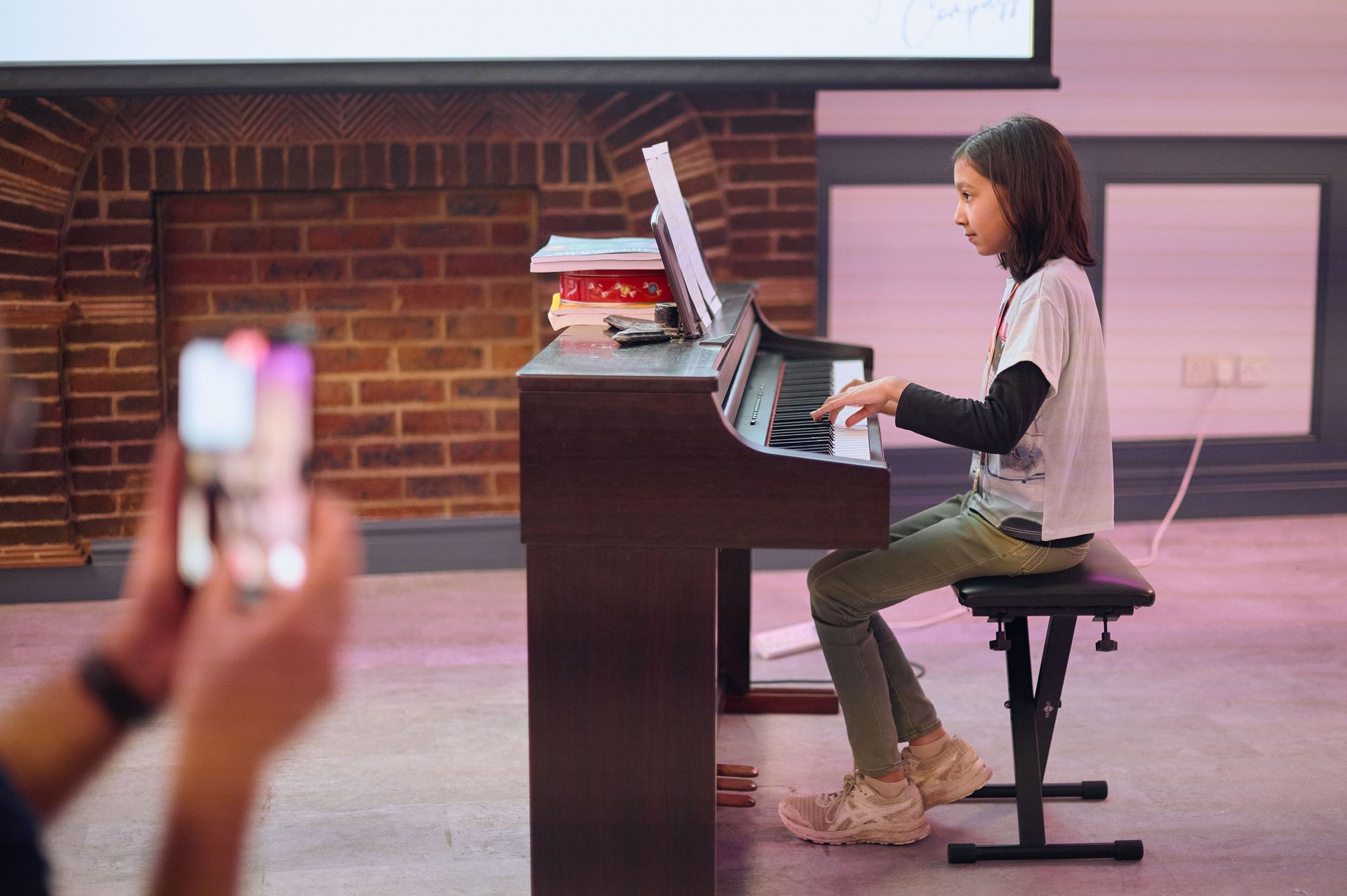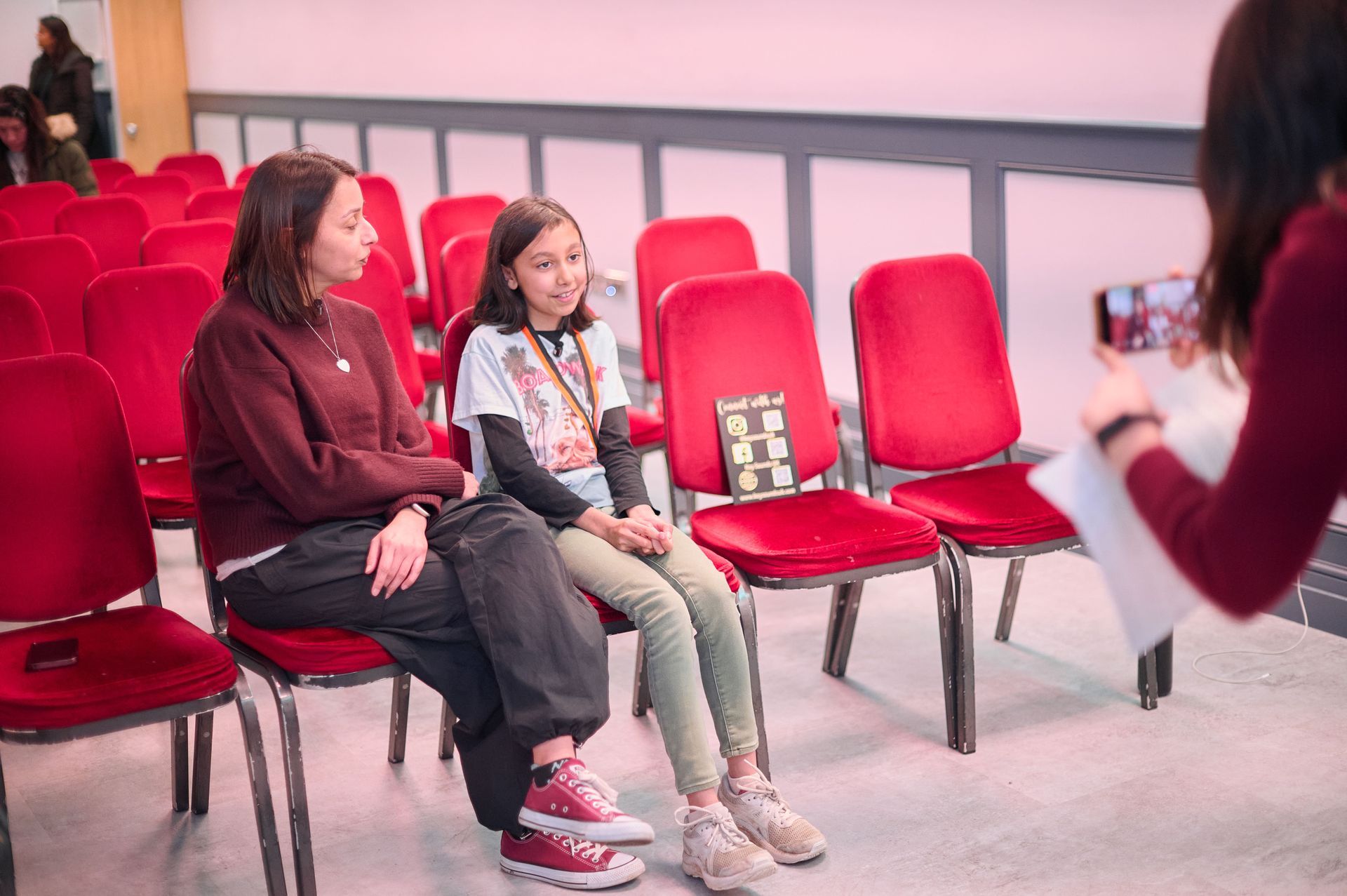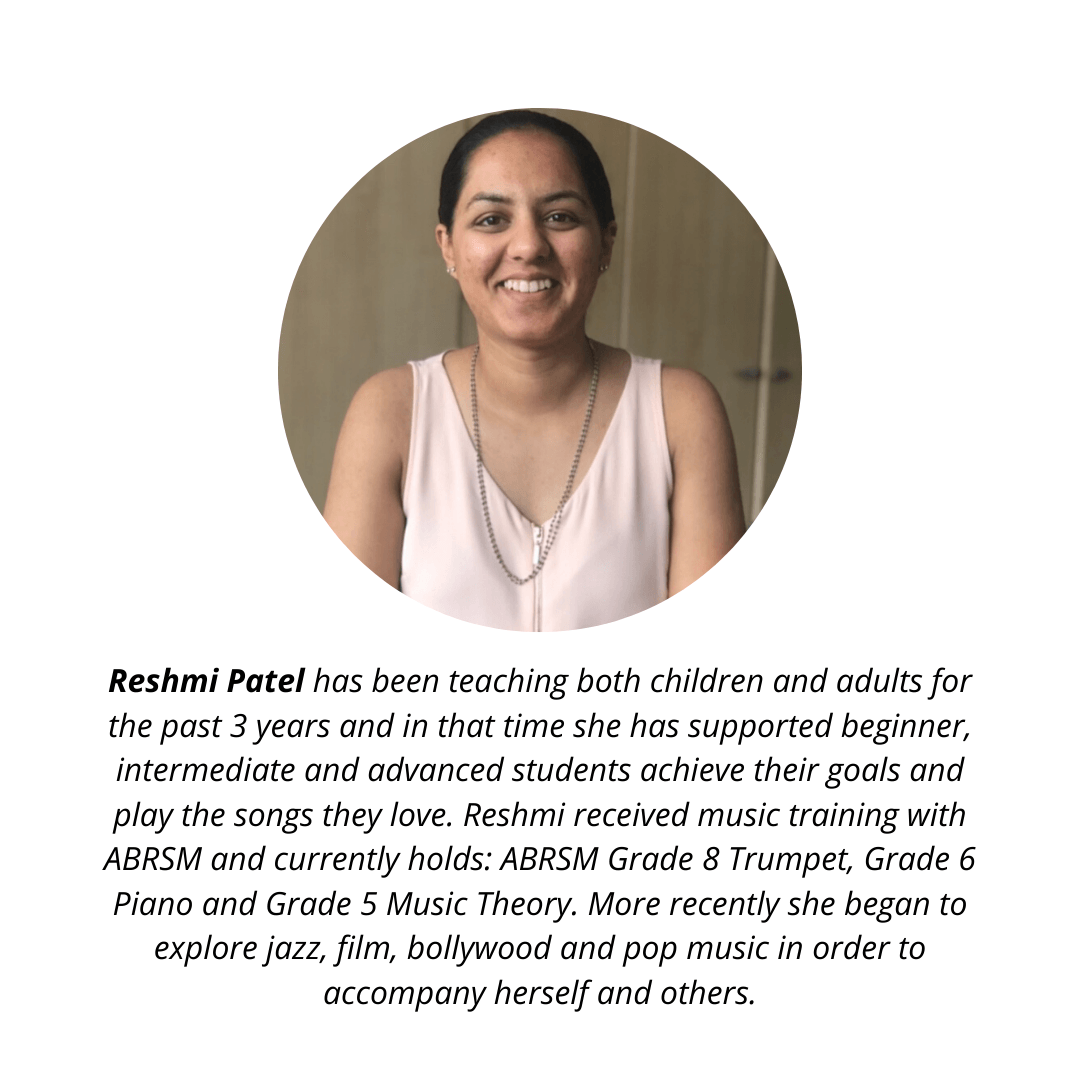Reshmi Patel • September 14, 2020
The Back to School Routine for Beginner Piano Players
For a lot of our students, they are returning back to school after five-six months!
According to our research and past experiences, we understand how difficult it can be to organise a student timetable once school is in full-swing. To overcome this issue, we’ve created an agenda of how students can incorporate music into their morning routine.
You are welcome to adjust the order of your morning routine and the length of time for each activity. We’d recommend at least 10-15 minutes of two musical activities per day for beginner musicians.

An important point to note is that you don’t have to constantly sit at your instrument to practice. In our view, the most optimal way to create an all-rounded and skilled musician is to implement small musical activities into your day.
Here are some examples of musical activities you could include in your day:
1. Instrument practice.
2. Listening to the piece you are learning.
3. Listening to music which inspires you.
4. Performing music at home to friends and family.
5. Performing at a local community center.
6. Reading the score of your music.
If you wish to know more about these hacks and resources, feel free to take a look around our website or connect with us directly.

One of the most common questions parents ask is: “Is my child ready for piano lessons yet?” The reassuring answer is that readiness isn’t about talent, reading music, or sitting still for long periods. Piano readiness is much more about exposure, curiosity, and comfort all of which can be nurtured naturally at home. Here’s how to tell if your child may be ready, and how to gently prepare them for a positive start. Many parents worry their child needs to: Read music Have perfect concentration Show obvious musical ability None of these are required. In fact, early piano learning is designed to develop these skills not expect them. Children often thrive when they: Show curiosity about sounds or music Enjoy listening and recognising familiar tunes Can focus for short periods (even just a few minutes) Are open to gentle guidance These skills typically begin developing between ages 5–7, which is why many teachers recommend this age range as a starting point though every child is different. At this stage, learning is as much about listening, coordination, and confidence as it is about playing notes. A Simple Way to Prepare Your Child (Actionable) You don’t need an instrument or formal practice to begin. Try this at home: Listening Together Search YouTube for familiar songs in piano versions (for example, Frozen II piano music) Listen together and ask: “Does this sound fast or slow?” “Is it high or low?” “How does it make you feel?” This builds musical awareness without pressure. Piano Curiosity If you have access to a piano or keyboard, let your child: Explore sounds freely Notice patterns of black and white keys Play without correction or instruction Curiosity is the goal not correctness. Why Trying a Lesson Often Gives the Clearest Answer Readiness can be hard to judge from the outside. A trial lesson isn’t a test it’s a chance for your child to: Experience the instrument Meet the teacher Feel what a lesson is like Many children who seem unsure at home settle quickly when guided gently in a supportive environment. A Reassuring Thought for Parents Starting piano isn’t about starting perfectly. It’s about starting positively. When children begin in a calm, encouraging setting, they’re far more likely to build confidence, enjoyment, and long-term engagement with music. If you’re unsure whether now is the right time, we’re always happy to help you explore what would suit your child best.

Why do some children continue with piano lessons for many years, while others take time to settle at the start? This is a question many parents quietly wonder about especially in the early months of learning. The answer is rarely about talent or musical ability. More often, it comes down to how supported a child feels as they find their feet, build confidence, and begin to enjoy the learning process. Emotional safety is the starting point not the whole story but it plays a vital role in helping children become comfortable enough to engage, explore, and eventually thrive. Emotional Safety: The Foundation for Learning For a child to learn effectively, they first need to feel: Accepted Understood Supported when things feel challenging In piano lessons, this means children feel able to: Try without fear of being “wrong” Make mistakes without embarrassment Ask questions or need reassurance Without this foundation, learning can feel fragile. With it, learning has room to grow. What Happens Once Children Feel Comfortable When emotional safety is in place, something important shifts. Children begin to: Relax into lessons Take small musical risks Engage more willingly This is often when enjoyment starts to develop. Enjoyment doesn’t mean every lesson is easy or perfect, it means children associate learning with curiosity, encouragement, and progress rather than pressure. Why Enjoyment and Teacher Connection Matter Children are far more likely to remain engaged when they: Enjoy the music they’re learning Feel understood by their teacher Trust the person guiding them week to week A strong, secure teacher–student relationship allows: Honest feedback without fear Gentle challenge without overwhelm Motivation that comes from within the child This connection doesn’t replace structure or expectations; it allows them to work effectively. When Children Want to Do More, Progress Follows Real progress tends to happen when children: Choose to engage Take pride in improving a piece Feel motivated to practise At this stage, practice becomes less about reminders and more about interest. Parents often notice: Fewer battles around practice Greater independence A natural desire to move forward Progress grows from positive momentum, not pressure. How Parents Can Support This at Home Parents play an important role in reinforcing this journey. Simple, supportive actions include: Praising effort rather than results Keeping expectations realistic Allowing learning to be gradual Communicating openly with the teacher When children feel supported both in lessons and at home, learning becomes more enjoyable and sustainable. A Reassuring Final Thought If your child feels comfortable, engaged, and supported, they are on the right path even if progress feels slow at times. Music learning is a long-term journey, and children thrive when that journey feels positive, encouraging, and meaningful. If you ever want to talk about how we support confidence, enjoyment, and long-term engagement in lessons, we’re always happy to help.

If every piano lesson looks different, how do you know the teaching is high quality? Some weeks your child is focused and confident. Other weeks they may be tired, distracted, fidgety, or need more encouragement especially when they’re young. That variation is completely normal. High-quality piano teaching isn’t about every lesson looking the same. It’s about having the right support, structure, and professional oversight in place so learning continues through those natural ups and downs. What makes the difference often isn’t what happens in a single 30-minute lesson, it's everything working quietly behind the scenes to ensure consistency, care, and long-term progress. Teaching as a Profession, Not in Isolation In professional settings, teachers don’t work in silos and high-quality piano teaching is no different. Rather than operating alone, teachers work within a shared framework where: Expectations are aligned Teaching approaches are discussed and refined Progress is viewed over time, not lesson by lesson This doesn’t limit individuality or creativity, it strengthens it. It means your child benefits from collective experience, shared standards, and continuity, rather than relying on one isolated perspective. The Role of Headteacher Oversight Alongside the class teacher, there is also a headteacher who oversees someone who understands your child’s learning journey beyond a single lesson. This provides: Consistency across weeks and terms A second professional perspective when needed Clear continuity if changes ever occur For parents, this means reassurance. For children, it means stability. Clear Structure Without Rigidity High-quality piano lessons are supported by: Clear learning pathways Age-appropriate expectations Thoughtful pacing This allows teachers to adapt lessons when children are tired, distracted, or having an off week without losing direction. Structure doesn’t mean pressure. It means your child’s learning always has purpose. Why This Matters for Your Child When lessons are supported by systems rather than chance: Progress is steadier Confidence is protected Learning continues even during busy phases A high-quality piano lesson is never just about what happens in the room. It’s about the support surrounding it. If you ever want to understand how your child’s learning is supported behind the scenes, we’re always happy to explain. If you have any questions feel free to reach out and ask us!

